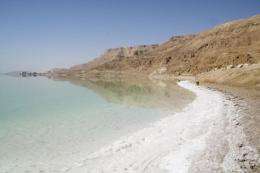December 7, 2011 report
Dead Sea drilling research project portends ominous future for Middle East

(PhysOrg.com) -- A team of researchers drilling in the center of the Dead Sea have found that approximately 120,000 years ago, the area became so dry the Sea dried up completely, or nearly so, and worse, it likely occurred over a lengthy period of time. Today the history rich sea, the lowest in the world, is shrinking too, but unlike back then, this time it’s due to human’s siphoning off water from the rivers that feed it leading to a precipitous drop that has reduced the depth of the water by some 10 meters since the mid nineties.
The Dead Sea Deep Drilling Project, as its been called, involved boring holes in two locations into the sea floor over four months between late 2010 and early 2011 and cost US $2.6 million, and was funded by the International Continental Scientific Drilling Program with additional contributions from other organizations and countries. Over the course of the drilling, the team, managed to pull up a 400 meter length of sediment from beneath the sea floor, giving the researchers a peak 200,000 years into the past. But it was the part of the sample that represented a time around 120,000 that really intrigued them, as there they found rocky pebbles similar to those found currently on the shore line. This meant that the sea had dried to the point where it may have had no water in it at all. And beneath the pebbles was a layer of salt about 45 meters thick, which is what researchers calculate, would occur if all the water in the sea were removed today. Thus, it appears that the Dead Sea was for a time, nothing more than a very large salt flats.
The idea that the Dead Sea could go dry is a very scary thing for those in the Middle East, especially for those who follow global warming theories and politics. While the water from the Dead Sea itself isn’t used for much of anything except swimming, the rivers that run into it are critical to the survival of millions of people in the area, and controlling those rivers is rife with controversy which has in the past led to wars, as the Dead Sea sits right between Israel and Jordan.
With many global warming models predicting a more arid Middle East, the specter of a dried up Dead Sea could possibly send the area into a period of turmoil dwarfing past conflicts, which would of course cause ripples all across the globe, leading to a very unstable future for virtually everyone.
© 2011 PhysOrg.com


















